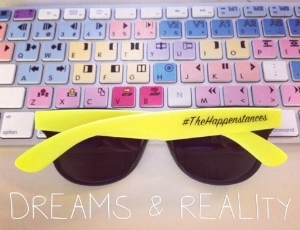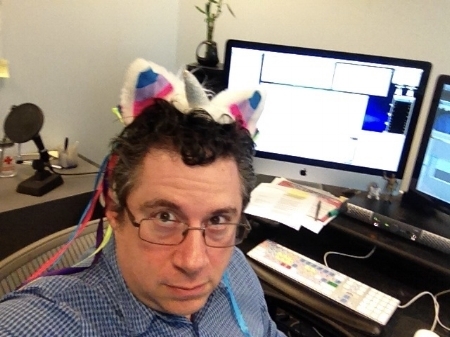DREAMS & REALITY - Michael Chaskes

Pete
Michael
Name: Michael Chaskes
A handful of credits: My most recognizable reality credits are ABC’s Supernanny and Bravo’s Real Housewives of New York City.
Where are you from?
I was born in Philadelphia and raised in nearby South Jersey. I left to attend college in Connecticut (Wesleyan University, where I majored in Film Studies), and headed out to Los Angeles right after I graduated in 1991.

Michael in his bay last Halloween as a unicorn.
I met Michael last year when he was the supervising editor and I was a producer on the very cool kids trivia game show Child Genius for the Lifetime channel. He has a very welcoming bay, a quick wit, and lightning fast editing fingers. I would bring him a stringout (see Michael's definition of a stringout below) and he would elevate the material with his cutting, music choices, and often visual graphics that aided the show immensely.
So Michael, how did you get into Reality TV?
Having studied cinema in college, I spent my first 10 years in LA trying to break in as a feature film editor. Although I ended up cutting a few very good low-budget independent films during that time (along with some not-so-good ones), I never got a full-fledged career going, and earned my living primarily from office jobs.
A few of my most story-worthy experiences actually occurred in my first few months in L.A. My very first “industry” gig was working as an unpaid apprentice editor on a low-budget indie film made by an unknown director, with the enigmatic title Reservoir Dogs.
Whoa!!
As an apprentice, my primary duty was the unglamorous chore of “reconstituting the trims” — which meant splicing rejected pieces of film and “mag” (magnetic soundtrack) back into the rolls they originally came from. (In the digital age, this obviously is no longer a thing.) But you’ll find my name in the end credits, and I got to meet Quentin Tarantino.
Right after that, I worked — again as an unpaid apprentice editor — at the legendary Roger Corman’s B-movie studio of that moment, Concorde Pictures in Venice. The site had previously been a lumberyard, and still looked like one; it’s now a very nice condo complex. These unpaid experiences soon led to some paid work as an assistant editor, and to my handful of actual feature editing gigs.
In late 2000, an editor I knew recommended me for a documentary series being produced for PBS. This turned out to be an amazing project called Senior Year, which was not as widely seen as it deserved to be. (Now you can watch the whole thing on YouTube — I recommend it highly.) I was hired as a junior-level editor, but I was too green to know that I should only be creating “stringouts” (very rough assemblies that more experienced editors will refine into finished scenes). Instead, I was turning in fully edited and polished scenes, with music scoring and all. Fortunately the director liked my work, and I was promoted to be one of the full editors. While Senior Year wasn't a reality show, strictly speaking, there was enough similarity that, after it was finished, the lead editor (the wonderful Susan Crutcher) suggested that I look for more work in reality TV, and I was given a few phone numbers to call.
I ended up messing around with some other documentary projects for another year and a half after that, but in 2003, I was hired to help cut a reality show called Faking It for TLC. Not that I knew this at the time, but the show's workflow was stripped-down and non-standard — instead of having a story department, editing teams, hotsheets, field notes, transcripts, and all that sort of thing, the production execs simply threw the editor into the bay with the director of an episode, along with all the director’s footage, and expected the two of them to hash out a cut between them. They expected long hours and long work-weeks, so it was a pretty intense director/editor collaboration, more like what you’d find in the feature world than in reality TV. I ended up cutting two episodes over the next several months, working with a kind and very talented director by the name of Dustin Lance Black, who it turned out was destined for much bigger things. (If you don’t recognize the name, Google him now!)
Another wow, wow, wow!
At that point, I had no clue how to do the stylistic bells and whistles that are common to reality TV. Luckily for me, Lance had editing experience himself, and was a naturally patient and helpful person besides; he essentially taught me how and when to do common little tricks like white flashes (very popular at the time) and speed ramps. After those were done, I also ended up cutting one episode of a special mini-series run of Junkyard Mega-Wars for the same company, but then their work dried up (at least for me).
After that I started cold-faxing my résumé to every reality production company I could find, and finally in May 2004, I got a call from the Post Supervisor at Weller/Grossman Productions. My résumé had caught his eye primarily because his wife had been one of the directors on the same season of “Faking It” that I’d worked on. I was hired to work on one particular show, Your Reality Checked (for the long-defunct Fine Living channel). For this show, they also assigned one editor per episode (as opposed to an editing-team approach). My new employers were overall impressed with the first episode I cut, though Gary Grossman, one of the company principals, gave me some great advice about how to cut to music and let montages breathe, which informed my whole approach to reality editing from that time forward. I cut another episode with the same story producer (the great Rob Blumenstein) and then was given a third episode to not only cut but also to story-produce entirely on my own, including writing the narration. This was a great experience and also a lot of fun — and, since I had no one else to turn to when I hit a trouble spot, it also taught me that no story or editing problem is insoluble, especially if you sleep on it. (I remember encountering at least one thorny story problem that seemed hopeless at 5 pm, but the solution appeared clear as day as soon as I returned the following morning.)
I ended up staying on at Weller/Grossman for 4 solid years, as they kept me busy with a variety of unscripted or soft-scripted shows, mostly for Food Network and HGTV, which built up my résumé to the point where I felt secure in my ability to find other work readily if the need arose. In 2008, the company essentially folded and I was let go, along with most of the other long-term people there. However, I was able to get hired right away at another company, thanks to a supervising producer I’d worked with earlier at Weller/Grossman who was interested in adding me to the editing team on her current show. Just as that show wrapped, I was asked by another former Weller/Grossman colleague to interview at a company then called Ricochet (now Shed Media) for a spot on the editing team for Supernanny. I got the job, was again kept on to work on other shows, and have remained there for over 8 years.
You seem to have a coveted situation in this freelance world, a pretty steady gig at a production company. Can you talk about that? How did it come about? What can an editor or producer do to help them along that path?
A big part of that is landing at the right company in the first place. If you take a job with employers who regard creative staff as interchangeable cogs (as I understand some do), they’ll be unlikely to appreciate your particular contribution or make an effort to keep you around. (Of course, some editors and producers enjoy having the freedom to move around from company to company, which also brings the freedom to choose from a wider range of projects. Overall, I prefer consistency.) I was lucky enough to wind up at two companies where I was able to make a good impression quickly, and where my abilities were valued. I was also fortunate to have been “well-seasoned” enough when I arrived that I didn’t embarrass myself through inexperience. (I realize I haven’t yet mentioned one brief stint on a show where, as a total newbie editor, I rejected a note being given to me directly from the head of the company, because I just didn’t know any better — and because I clearly hadn’t developed much common sense yet.)
I think for anyone who is trying to make themselves as invaluable as possible, I’d offer the following advice:
1) BE PASSIONATE. If you don’t love editing, you won’t be the best editor you can be. I imagine that the same goes for story producing. The process of making TV can be exhausting and frustrating at times, but nonetheless, don’t ever stop caring about making the show as good as you can possibly make it. Your commitment will show.
2) WORK COOPERATIVELY. I’ve always found great collegiality and helpfulness among and between editors and story producers — do your best to keep all your collaborations friendly, productive, and goal-oriented. Not only will this result in a more pleasant working experience and a better show, it’ll build a network of people who want to keep working with you.
3) BE FLEXIBLE. If you’re angling to stay put at a particular company, part of the tradeoff may be cheerfully accepting the assignments you’re given.
What's a weird thing about Reality TV that no one thinks about?
We have ridiculous conversations in the office. Since a lot of reality shows deal with material that's risqué or just plain raunchy, we end up having to discuss all manner of subjects that would be wildly out of place in a typical office context.
This is true... haha!
You're always working, you have a family, you're active in your community, and you're up on the latest movies and television it seems. Do you pursue any other hobbies/ side projects, etc? How do you find balance for the things that you're into?
I’m fortunate that editing is my hobby as well as my profession — if I didn’t get paid to do it for a living, I’d likely be finding ways to do it on my own time. Every once in a while, I’m able to help out a friend or a non-profit with a video project, or make a video to show at a family celebration, though I’m not working on anything else right now. My other interests include — as you said — watching movies and TV, as well as reading, playing piano, some light bicycling and hiking, doing some community service work, and — a new and very geeky pursuit — participating in adult spelling bees (there are a couple of them out there).
Lately, I’ve also become much more politically active, and I’m hoping to find a way to put my editing skills to use in that arena as well at some point. Keeping everything in balance has certainly been an ongoing challenge, and it’s never easy, but I think the key is to establish at least rough boundaries for all of one’s activities, and try to stick to them as much as possible.
My family is my top priority.
Thank you Michael!! Hey Reality TV friends! I'd like to interview YOU! Please email me at TheHappenstances at gmail.com or message me on Facebook or whatever. THANK YOU!!!



